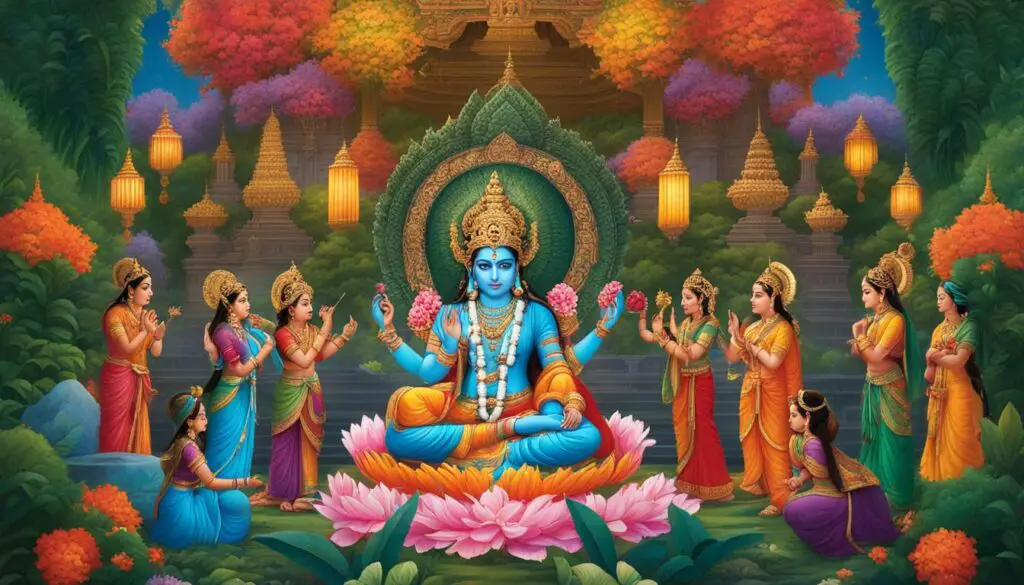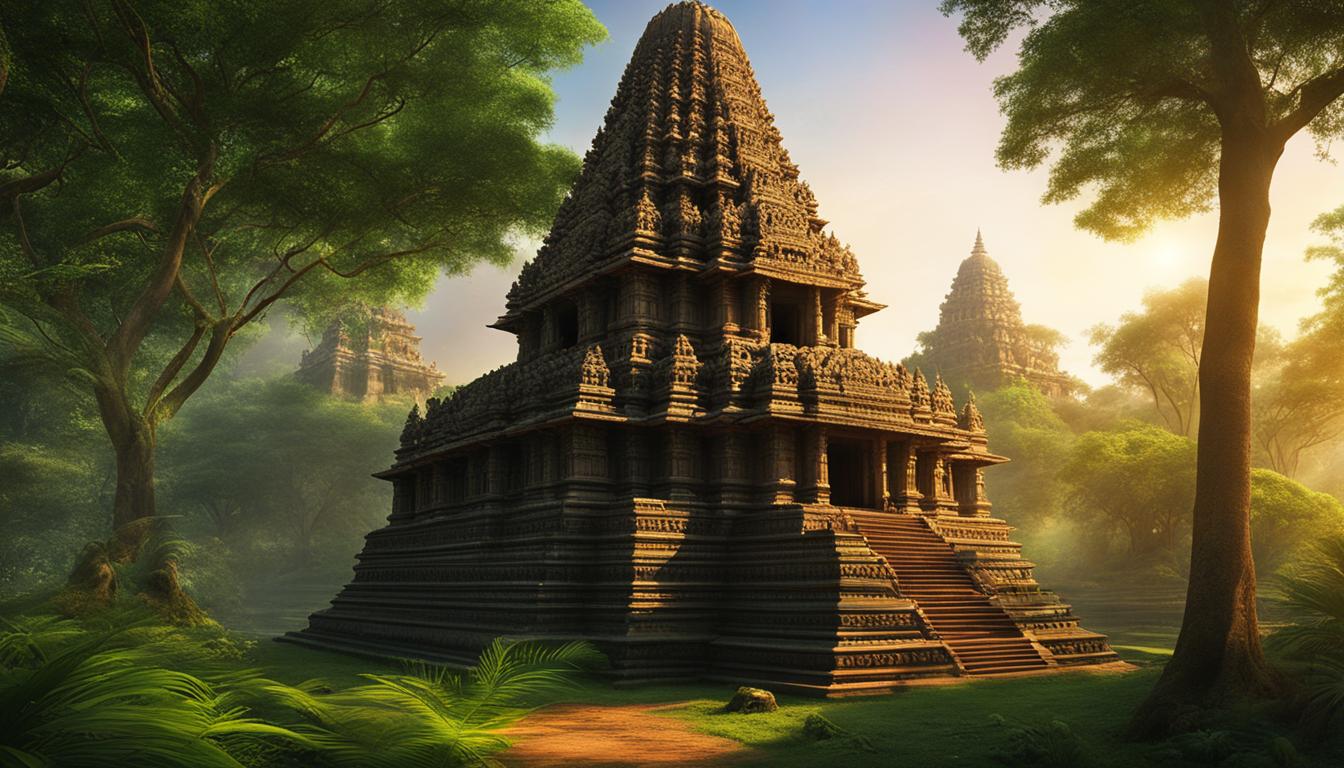Hinduism, a diverse and ancient religion often referred to as a “way of life” or a “family of religions,” has its roots in the ancient Indus Valley civilization, near modern-day Pakistan. Dating back to around 2300 B.C. to 1500 B.C., Hinduism emerged as a fusion of various beliefs from different groups of people who came together and shared their ideas and practices.
Central to Hinduism is the belief in a single deity, known as “Brahman,” while still acknowledging the existence of other gods and goddesses. Concepts such as samsara (the cycle of life, death, and reincarnation), karma (the law of cause and effect), and dharma (a code of living) form the foundation of Hindu philosophical thought. The ultimate goal for Hindus is to attain salvation, known as “moksha,” and liberate themselves from the cycle of rebirth.
By exploring the ancient roots of Hinduism, we can gain insight into how this vibrant religion has shaped the lives of millions of people throughout history and continues to be a profound influence today.
Key Takeaways:
- Hinduism has its origins in the ancient Indus Valley civilization, dating back to around 2300 B.C. to 1500 B.C.
- It is a fusion of various beliefs and practices from different groups of people.
- Central concepts of Hinduism include samsara, karma, dharma, and the pursuit of moksha.
- Hinduism is often referred to as a “way of life” or a “family of religions” rather than a single organized religion.
- The exploration of the ancient roots of Hinduism provides a deeper understanding of this enduring faith.
Hinduism Beliefs and Symbols
Hinduism encompasses a wide range of beliefs and practices that have evolved over thousands of years. Central to Hindu philosophy is the concept of samsara, the eternal cycle of birth, death, and rebirth. Hindus also believe in karma, the law of cause and effect, which dictates that one’s actions in this life will determine their fate in future lives.
The principles of dharma and atman are fundamental to Hinduism. Dharma refers to the moral and ethical duties that individuals must follow to maintain social order and spiritual harmony. Atman, on the other hand, represents the eternal soul or self that exists within each living being.
Hindus hold a deep reverence for all living creatures and consider the cow to be a sacred animal. Cows are often seen as a symbol of motherhood, fertility, and abundance in Hindu culture.
Hinduism is closely related to other Indian religions, such as Buddhism, Sikhism, and Jainism, which share similar beliefs and values. These religions have been influenced by each other over the centuries, resulting in a rich tapestry of spiritual traditions.
Hindu Symbols
Hinduism is known for its rich symbolism and iconic imagery. Two prominent symbols associated with Hinduism are the om symbol and the swastika symbol.
The om symbol is considered one of the most sacred symbols in Hinduism. It represents the primordial sound of creation, encompassing the past, present, and future. The om symbol is often chanted during meditation and is a common sight in family shrines and Hindu temples.
The swastika symbol carries different meanings in different cultures. In Hinduism, it represents good luck, well-being, and prosperity. However, it’s important to note that in modern times, the swastika symbol has been associated with Germany’s Nazi Party, leading to its misinterpretation and misuse.
Despite its unfortunate connotations, the swastika symbol remains an integral part of Hindu culture and religious traditions.
Hinduism Holy Books
Hinduism, unlike many other religions, does not have one single holy book that serves as the ultimate authority. Instead, it values and draws inspiration from a rich collection of sacred writings.
The most important and ancient of these texts are the Vedas, which were composed around 1500 B.C. The Vedas contain revelations received by the ancient saints and sages and are divided into four main collections:
- The Rig Veda
- The Samaveda
- The Yajurveda
- The Atharvaveda
These texts hold profound wisdom and knowledge about various aspects of life and spirituality. They explore topics such as cosmology, rituals, prayers, and philosophy. The Vedas serve as the foundation of Hinduism, shaping its beliefs, rituals, and practices.
In addition to the Vedas, Hinduism values several other significant texts. One such text is the Upanishads, which are philosophical treatises that delve into the nature of reality, the soul, and the path to salvation. The Upanishads focus on spiritual knowledge and meditation, guiding seekers of truth towards self-realization.
Another prominent sacred text is the Bhagavad Gita, a 700-verse conversation between the prince Arjuna and the god Krishna. The Bhagavad Gita explores complex moral and philosophical dilemmas, teaching profound lessons on duty, righteousness, and the path to liberation.
“You have the right to perform your prescribed duty, but you are not entitled to the fruits of your actions.” – Bhagavad Gita
The 18 Puranas, a collection of ancient narratives, genealogies, and legends, play a crucial role in preserving Hindu mythology and folklore. These texts bring to life the stories of various gods, goddesses, heroes, and demons, capturing the imagination of devotees across generations.
Two epic poems, the Ramayana and the Mahabharata, also hold immense significance in Hinduism. The Ramayana narrates the heroic tale of Prince Rama, his wife Sita, and their journey to rescue her from the demon king Ravana. On the other hand, the Mahabharata chronicles the epic Kurukshetra War and explores complex themes of duty, honor, and morality.
These holy books collectively provide a rich tapestry of spiritual wisdom and guidance, shaping the beliefs and practices of Hinduism.

| Vedic Texts | Main Themes |
|---|---|
| Rig Veda | Prayers, hymns, rituals |
| Samaveda | Chants, melodies, musical notations |
| Yajurveda | Rituals, sacrifices, ethical teachings |
| Atharvaveda | Spells, charms, healing remedies |
Table: Overview of the Four Vedas and their main themes.
Hindu Gods and Worship
Hinduism is a vibrant and diverse religion that encompasses a pantheon of gods and goddesses. In addition to the supreme God force, Brahman, Hindus worship various deities who embody different aspects of the divine. Let’s explore some of the most prominent Hindu gods and the worship practices associated with them.
Major Hindu Deities
1. Brahma: Known as the creator, Brahma is often depicted with four heads, each facing a different direction. He symbolizes the power of creation and is associated with knowledge and wisdom.
2. Vishnu: Vishnu is revered as the preserver and protector of the universe. He is often depicted with blue skin and four arms, holding various symbols of his power. Vishnu is believed to reincarnate in different forms, known as avatars, to restore balance and harmony to the world.
3. Shiva: Considered the destroyer of evil and the transformer, Shiva is a complex deity. He is depicted as a meditating ascetic with matted hair and a third eye on his forehead. Shiva represents both destruction and regeneration, symbolizing the cyclical nature of existence.
4. Devi: Devi, also known as Durga or Kali, is the goddess who fights to restore dharma (righteousness). She is depicted with multiple arms, each holding a weapon, and is a fierce protector of the universe.
5. Krishna: Krishna is a beloved figure in Hinduism, revered as the god of compassion, love, and devotion. He is often portrayed as a playful child, a young cowherd, or a charioteer in the epic Mahabharata. Krishna’s teachings on love, duty, and selflessness have deeply influenced Hindu philosophy.
6. Lakshmi: Lakshmi is the goddess of wealth, prosperity, and purity. She is depicted with four hands, often holding lotus flowers and gold coins, symbolizing abundance and good fortune. Lakshmi is worshipped for blessings of material and spiritual wealth.
7. Saraswati: Saraswati is the goddess of learning, knowledge, and the arts. She is depicted playing the veena, a musical instrument, and holding a book symbolizing wisdom. Devotees seek her blessings for inspiration, creativity, and success in education and the arts.
Hindu Worship: Temples and Puja
Hindu worship, known as puja, is a fundamental aspect of expressing devotion to the gods. Puja can be performed in temples called mandirs or in the comfort of one’s home. During puja, devotees offer prayers, incense, flowers, fruits, sweets, and other offerings to the deities as a sign of respect and love.
In temples, priests lead elaborate ceremonies and rituals, invoking the presence of the deity through chanting, singing, and offering prayers. Devotees participate in these rituals, seeking blessings and a deeper spiritual connection. Temples are vibrant spaces where devotees gather to celebrate festivals, perform rituals, and seek solace.
In homes, devotees often have personal shrines dedicated to specific deities. These shrines act as a focal point for daily worship and meditation. Offerings and prayers are made to the deity of choice, bringing a sense of peace, gratitude, and divine connection into the household.
Hindu Pilgrimages
Hinduism places great importance on pilgrimages to sacred sites as a means of deepening one’s spiritual connection and seeking blessings. India, the birthplace of Hinduism, is home to numerous pilgrimage destinations.
From the holy city of Varanasi, where the sacred Ganges River flows, to the majestic temples of Rishikesh, the serene shores of Rameswaram, and the revered Mt. Kailash in Tibet, pilgrimages offer a profound spiritual experience. The journey itself becomes a form of worship, as devotees undertake physical and mental challenges to reach these sacred sites.
By visiting temples and sacred places, Hindus seek spiritual purification, enlightenment, and a closer bond with the divine. Pilgrimages offer an opportunity to reflect, introspect, and connect with the rich cultural and spiritual heritage of Hinduism.

| Deity | Symbolism |
|---|---|
| Brahma | Creator, knowledge, wisdom |
| Vishnu | Preserver, protector, balance |
| Shiva | Destroyer, transformation, regeneration |
| Devi | Fighter for righteousness, protectress |
| Krishna | Compassion, love, devotion |
| Lakshmi | Wealth, prosperity, purity |
| Saraswati | Learning, knowledge, arts |
Conclusion
Hinduism, with its ancient roots dating back thousands of years, is one of the world’s oldest religions. Its diverse beliefs, traditions, and practices have shaped the lives of millions of people throughout history. Hinduism continues to be a vibrant and enduring faith, with followers around the globe.
Its concepts of karma, dharma, and moksha, along with its rich mythology and worship of numerous deities, contribute to its profound impact on individuals and communities. By exploring the origins and evolution of Hinduism, we can gain a deeper understanding of its timeless traditions and beliefs and appreciate the enduring legacy of this ancient religion.
FAQ
What is the origin of Hinduism?
Hinduism has its origins in the Indus Valley, near modern-day Pakistan, dating back to around 2300 B.C. to 1500 B.C.
How is Hinduism described?
Hinduism is often referred to as a “way of life” or a “family of religions” rather than a single organized religion.
What are some key beliefs in Hinduism?
Hindus believe in the doctrines of samsara (the cycle of life, death, and reincarnation), karma (the law of cause and effect), dharma (a code of living), and the belief in the soul (atman) and the ultimate goal of achieving salvation (moksha).
What are the primary sacred texts in Hinduism?
The primary sacred texts in Hinduism are known as the Vedas, composed around 1500 B.C. Other important texts include the Upanishads, the Bhagavad Gita, the 18 Puranas, the Ramayana, and the Mahabharata.
Who are some of the key deities in Hinduism?
Some prominent deities in Hinduism include Brahma (the creator), Vishnu (the preserver), Shiva (the destroyer), Devi (the goddess who fights to restore dharma), Krishna (the god of compassion and love), Lakshmi (the goddess of wealth and purity), and Saraswati (the goddess of learning).
Where does Hindu worship take place?
Hindu worship, known as puja, takes place in temples called mandirs, as well as in homes where devotees have shrines dedicated to specific deities.
